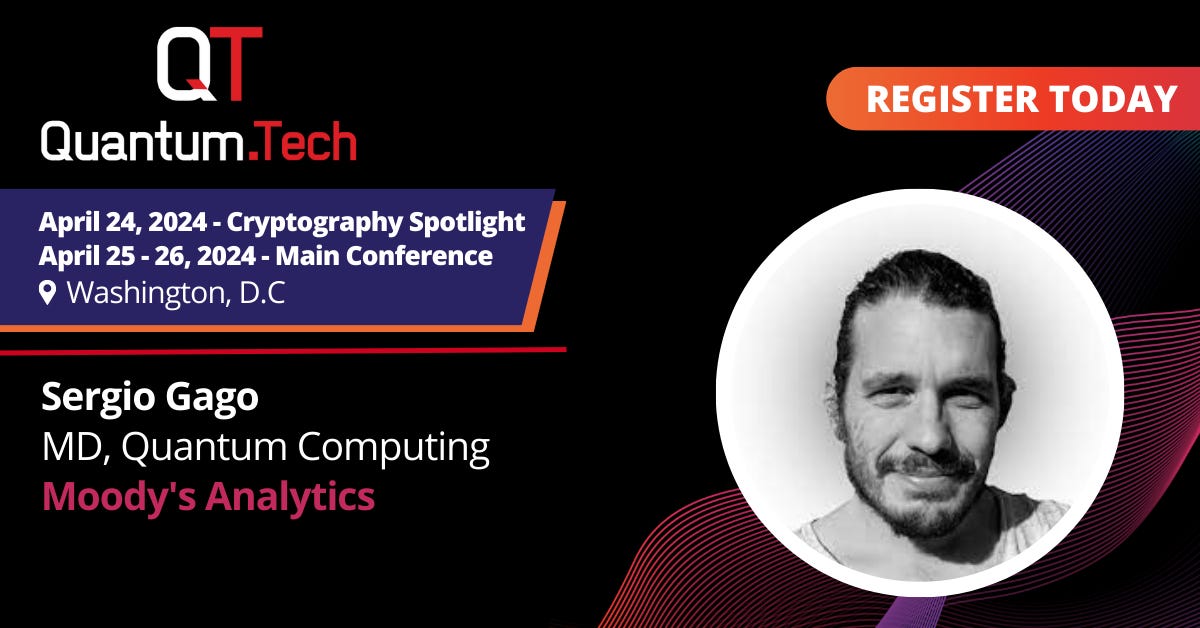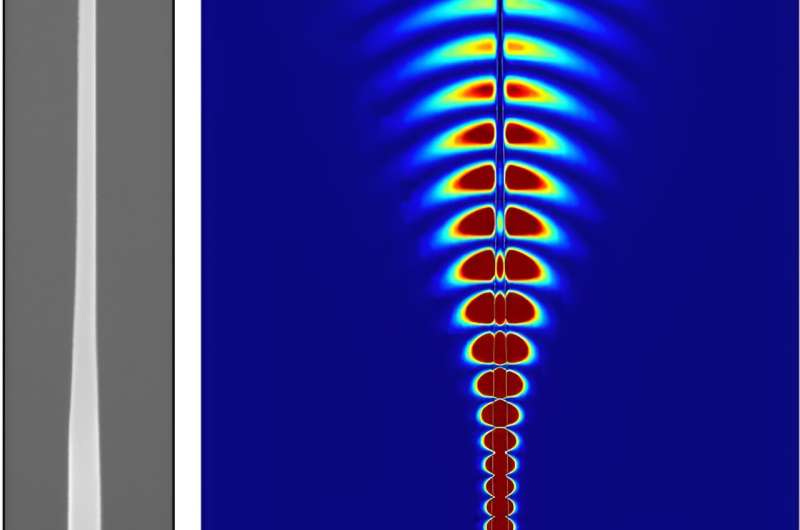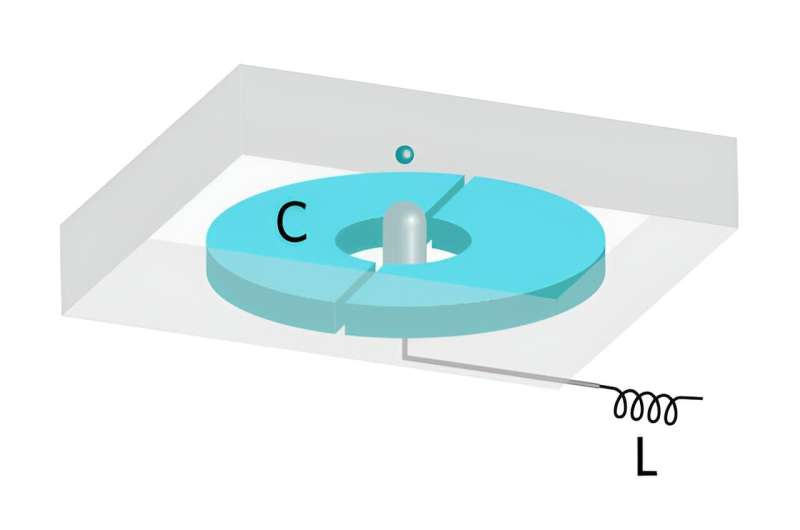The Week in Quantum Computing - April 1st 2024 - IBM, Diraq, and Alice & Bob Make Breakthroughs
Issue #179
The Week in Quantum Computing. Brought to you by Sergio Gago (@piratecto).
Alert: No Apri’ls fools on this Newsletter today! :)
Quick Recap
Big strides have been made in quantum computing this week. At the University of Waterloo, researchers have developed a method to produce entangled photon pairs from quantum dot sources, enhancing quantum communication security. This process is 65 times more efficient than previous methods. On the hardware front, IBM's Condor chip with over 1,000 qubits is facing competition from neutral-atom qubits getting over 6000 qubits on a neutral atom array. Still, IBM makes the cover of Nature with a new error correcting code. Now 12 logical qubits can be preserved for nearly 1 million syndrome cycles using 288 physical qubits. Prior surface codes would require nearly 3,000 physical qubits for the same thing. Is this getting us closer to a Shor-capable QC? Well, that is not all, Sydney-based startup Diraq has made a major breakthrough by getting quantum processors to work at temperatures 20 times warmer than previously achieved. Meanwhile, Alice & Bob in France has received a €16.5 million grant to optimize quantum computing efficiency and accelerate market readiness. 2024 is getting hotter and hotter. If that is not enough, Riken tries to make qubits by getting electrons to dive in Helium.
On the algorithm side, a team from Waseda University has developed a post-processing variationally scheduled quantum algorithm (pVSQA) that outperforms conventional quantum algorithms without post-processing on real quantum devices. Another team from TU Berlin has presented a constructive proof demonstrating that quantum computers have a super-polynomial advantage over classical computers in approximating combinatorial optimization problems. Their work builds on earlier research by Kearns and Valiant and utilizes Shor’s quantum algorithm for factoring.
Join me at this event. “Ion Maiden” concert included!
The Week in Quantum Computing
The world is one step closer to secure quantum communication on a global scale
Researchers at the University of Waterloo's Institute for Quantum Computing (IQC) have successfully combined two Nobel prize-winning concepts to advance quantum communication. The team has developed a method to efficiently produce nearly perfect entangled photon pairs from quantum dot sources, enhancing quantum communication security. The process, 65 times more efficient than previous methods, was achieved by embedding semiconductor quantum dots into a nanowire. Dr. Michael Reimer and Ph.D. student Matteo Pennacchietti, in collaboration with the National Research Council of Canada and Single Quantum, used high-resolution single photon detectors to boost entanglement.
https://phys.org/news/2024-03-world-closer-quantum-communication-global.html
The Best Qubits for Quantum Computing Might Just Be Atoms
IBM's quantum computing chip, Condor, with over 1,000 quantum bits (qubits) has been overshadowed by a new contender - qubits made from individual atoms, or "neutral-atom qubits". The last couple of years have seen rapid advancements in neutral-atom quantum computing, with at least five companies racing to commercialize the technology. Physicist Mikhail Lukin and his team at Harvard were among the pioneers of this approach, recently creating programmable quantum circuits with hundreds of neutral-atom qubits. A team at the California Institute of Technology also reported an array of 6,100 atomic qubits. Unlike superconducting qubits, neutral-atom qubits have longer coherence times and require no complex wiring, making them potentially more scalable.
https://www.quantamagazine.org/the-best-qubits-for-quantum-computing-might-just-be-atoms-20240325/
Novel quantum algorithm proposed for high-quality solutions to combinatorial optimization problems
Assistant Professor Tatsuhiko Shirai and Professor Nozomu Togawa from Waseda University, Japan, have developed a post-processing variationally scheduled quantum algorithm (pVSQA) for combinatorial optimization problems (COPs). The algorithm combines variational scheduling with a post-processing method that transforms infeasible solutions into feasible ones. This allows for near-optimal solutions for constrained COPs on both quantum annealers and gate-based quantum computers. The pVSQA algorithm outperforms conventional quantum algorithms without post-processing on real quantum devices. Dr. Shirai suggests that efficiently solving COPs is crucial for addressing various societal challenges like climate change and sustainable development. The research was published in the IEEE Transactions on Quantum Engineering.
https://techxplore.com/news/2024-03-quantum-algorithm-high-quality-solutions.html
Research Team Proves Quantum Computers' Super-Polynomial Advantage over Classical Computers in Combinatorial Optimization Problems
A team of researchers, including Niklas Pirnay, Vincent Ulitzsch, Frederik Wilde, Jens Eisert, and Jean-Pierre Seifert, have presented a constructive proof demonstrating that quantum computers have a super-polynomial advantage over classical computers in approximating combinatorial optimization problems. Their work builds on earlier research by Kearns and Valiant and utilizes Shor’s quantum algorithm for factoring. They provide instances that are difficult for classical computers to approximate up to polynomial factors, while also presenting a quantum algorithm that can efficiently approximate the optimal solution within a polynomial factor.
https://www.science.org/doi/10.1126/sciadv.adj5170
Diraq's Quantum Computing Breakthrough: Hot Qubits Operate at Unprecedented Temperatures, Paving the Way for Cost-Effective Supercomputing
Sydney-based quantum computing startup, Diraq, has made a significant breakthrough by getting quantum processors to work at temperatures 20 times warmer than previously achieved. This development, published in Nature, could reduce costs and complexity in quantum computing, which typically requires operations near absolute zero (-273.15 °C) to prevent qubits from faltering. Diraq's innovation, termed 'hot qubits', utilises silicon 'quantum dot' technology and could enable calculations beyond the reach of current supercomputers. This follows Diraq's recent $15 million Series A-2 raise, led by Quantonation, bringing its total funding to $135 million. As Diraq's CEO Andrew Dzurak suggests, this advancement could lead to faster, more accurate predictions and analyses.
Advancements in Quantum Computing and AI May Impact PQC Migration Timelines
In a recent paper, Dr. Robert Campbell, Dr. Whitfield Diffie, and Charles Robinson discuss how the rapid advancements in hybrid quantum-classical computing, artificial intelligence (AI), machine learning (ML), and deep learning (DL) could pose significant threats to encryption, impacting Post-Quantum Cryptography (PQC) transition timelines. They highlight the potential dangers of Grover's Adaptive Search (GAS) and the quantum-accelerated Harrow-Hassidim-Lloyd (HHL) Algorithm, both of which could be used to attack encryption more efficiently. The authors emphasize the need for a proactive, coordinated approach to developing quantum-resistant AI/ML cryptographic solutions in response to these threats.
https://www.preprints.org/manuscript/202402.1299/v1
New ion trapping approach could help quantum computers scale up
Researchers at ETH Zurich have developed a novel ion trapping approach that could potentially enhance the scalability of quantum computers. The team employed static magnetic and electric fields instead of oscillating electromagnetic fields to trap ions, which are used as building blocks for quantum computers. This new method offers improved control over an ion's quantum state and position. Current quantum processors can manage around 30 qubits, but this method could potentially handle millions. The ETH Zurich team's approach mitigates issues such as heating and trap configuration restrictions that are common with radiofrequency fields, marking a significant step towards the scaling up of trapped ions for quantum computation.
https://physicsworld.com/a/new-ion-trapping-approach-could-help-quantum-computers-scale-up/
ALGORITHMIC WARFARE: Intelligence Community Seeking Quantum Computing Know-How
The Office of the Director of National Intelligence’s research arm has launched a new program to better understand the opportunities and challenges posed by advanced quantum computing methods.
Much of the intelligence community’s work is done through computer technology, and given the potential of quantum computing to solve complex problems faster than classical systems, “it really behooves us to see what that future looks like and what the challenges are in reaching it,” said Michael Di Rosa, program manager for the new Entangled Logical Qubits, or ELQ, program at the Intelligence Advanced Research Projects Agency.
Exploring quantum-informed recursive optimization algorithms on Amazon Braket
Jernej Rudi Finžgar, Aron Kerschbaumer, Christian Mendl, Helmut Katzgraber, and Martin Schuetz from Amazon Quantum Solutions Lab have developed a hybrid quantum-informed recursive optimization (QIRO) algorithm. This algorithm aims to guarantee solution feasibility in constrained optimization problems, which are often complex and crucial in many industry sectors. The team demonstrated the algorithm using the QuEra Aquila neutral atom quantum device available through Amazon Braket, AWS's quantum computing service. The QIRO algorithm addresses feasibility issues of constrained problems by recursively simplifying the problem based on information obtained from a quantum device.
Alice & Bob and research partners granted €16.5 million in public funding to make quantum computing 10 times cheaper
Quantum computing hardware developer Alice & Bob, alongside academic partners ENS de Lyon and Mines Paris-PSL, have received a €16.5 million grant from Bpifrance. The funding will support their "Cat Factory" project, aiming to optimize quantum computing efficiency, reduce costs, and accelerate market readiness. Alice & Bob, specializing in cat qubits, aims to develop a fault-tolerant quantum computing architecture by 2027. Theau Peronnin, CEO of Alice & Bob, highlights the project's focus on energy and cost savings. The project also plans to reduce the hardware needed for running a quantum computer, according to Florent Di Meglio, the project's lead at Mines Paris—PSL.
https://alice-bob.com/newsroom/alice-bob-wins-16-million-grant/
NSA Warns of Quantum Computing Breakthrough Threats, Amps Up Quantum-Resistant Security Measures Amidst Rising Concerns Over China's Tech Advancements
The National Security Agency (NSA) has expressed concerns about a potential breakthrough in quantum computing by adversaries, which could threaten global economic security and compromise top-secret communication systems. According to NSA Director of Research, Gil Herrera, an unexpected advancement in quantum technology could crack encryption systems protecting everything from financial transactions to nuclear weapons communications. Herrera warns that no country currently possesses a useful quantum computer, but a sudden development could have serious implications for U.S. security. The NSA is already deploying quantum-resistant algorithms to counter potential quantum attacks. However, concerns remain high, particularly about China's efforts to achieve computing breakthroughs.
https://www.washingtontimes.com/news/2024/mar/25/nsa-fears-quantum-surprise-if-this-black-swan-even/
Landmark IBM error correction paper published on the cover of Nature
IBM and UC Berkeley have published a paper in Nature detailing their creation of a quantum error-correcting code that is 10 times more efficient than previous methods, marking a significant advancement in quantum computing research. The code, known as the "gross code," significantly reduces the overhead of quantum error correction, making it more feasible for quantum circuits with billions of gates. The research builds on the work of Pavel Panteleev and Gleb Kalachev at Moscow State University, who in 2022 proved the existence of asymptotically good codes. This development signifies a clear path towards running complex quantum circuits on superconducting transmon qubit hardware, bringing the world one step closer to practical quantum computing.
https://research.ibm.com/blog/nature-qldpc-error-correction
High-threshold and low-overhead fault-tolerant quantum memory
Sergey Bravyi, Andrew W. Cross, Jay M. Gambetta, Dmitri Maslov, Patrick Rall, and Theodore J. Yoder have developed a high-threshold, low-overhead fault-tolerant quantum memory. It uses a family of low-density parity-check codes to achieve an error threshold of 0.7% for the standard circuit-based noise model, matching the surface code's performance that led for 20 years. The researchers demonstrated that 12 logical qubits can be preserved for nearly 1 million syndrome cycles using 288 physical qubits in total, assuming a physical error rate of 0.1%. In comparison, the surface code would require nearly 3,000 physical qubits. This development brings low-overhead fault-tolerant quantum memory closer to realization in near-term quantum processors.
https://www.nature.com/articles/s41586-024-07107-7
Singtel collaborates with Cisco, Fortinet and Nokia to build quantum-safe solutions for enterprises
Singtel, in collaboration with Cisco, Fortinet, and Nokia, is developing quantum-safe solutions for enterprises, focused on 5G, cybersecurity, business solutions, and digital transformation. The partnership aims to leverage the strengths of each company to create robust, future-proof strategies against potential quantum computing threats.
Think you can ignore quantum computing? Think again.
Quantum computing is poised to disrupt the current cryptographic systems, according to Dustin Moody, leader of Post Quantum Cryptography (PQC) at the National Institute for Standards and Technology (NIST). In response to this threat, NIST has announced plans to standardize four PQC algorithms in summer 2022, with several countries and major companies already preparing to adopt these standards. Jeff Wong, global chief innovation officer at EY, advises CIOs to start planning for these changes in their cybersecurity upgrades, while also protecting against potential "store-now, decrypt-later" attacks. Meanwhile, HSBC has established a dedicated quantum technologies program, with a focus on both defense and compute use cases, according to Philip Intallura, global head of quantum technologies at HSBC.
https://www.cio.com/article/2074464/think-you-can-ignore-quantum-computing-think-again.html
Zapata AI and Andretti Acquisition Corp. Announce Closing of Business Combination
Zapata AI has completed its business combination with Andretti Acquisition Corp., a special purpose acquisition company. The newly combined entity, renamed Zapata Computing Holdings Inc., will trade on the Nasdaq under the ticker "ZPTA" from April 1, 2024. CEO Christopher Savoie emphasized the move will enhance Zapata AI's financial flexibility, fuel growth, and drive innovation in tackling computationally complex problems. The company's proprietary AI techniques and quantum algorithms serve a range of enterprise and government clients, including Sumitomo Mitsui Trust Bank, BBVA, BP, BASF, DARPA, and Andretti Global.
https://zapata.ai/news/zapata-ai-andretti-acquisition-announce-business-combination-closing/
Quantum Computing's Leap Forward: From Feynman's Vision to 1000+ Qubits Machines, Nearing Practical Applications
Quantum computing has made significant strides, with recent advancements in "logical qubits" signaling that the technology's practical applications may be closer than previously thought. The technology's journey, which can be traced back to Richard Feynman's 1959 suggestion of leveraging quantum mechanics for computation, has evolved to the point where there are now three quantum computers each boasting over 1,000 qubits. The usefulness of a quantum computer can be classified into three categories: utility, advantage, and supremacy. Quantum supremacy involves a quantum computer solving a problem that is infeasible for classical computers, while quantum advantage does not require the problem to be unsolvable but suggests other benefits such as cost, space, and energy efficiency.
https://www.moodysanalytics.com/articles/2024/the-road-to-useful-quantum-computing
Benchmarking highly entangled states on a 60-atom analogue quantum simulator
The research team led by Adam L. Shaw, Zhuo Chen, Joonhee Choi, and others have successfully benchmarked highly entangled states on a 60-atom analogue Rydberg quantum simulator. The team demonstrated that quantum systems are entering a competitive regime where classical computers must make approximations to represent highly entangled quantum states. They developed a new model for evaluating the ability of both analogue and digital quantum devices to generate entanglement in the beyond-classically-exact regime. The experiment proved competitive with state-of-the-art digital quantum devices performing random circuit evolution. The researchers introduced a new algorithm, Lightcone-MPS, to match the experiment's performance.
https://www.nature.com/articles/s41586-024-07173-x
Quantum Coalition in the Netherlands Takes on 50-Qubit Target
The Dutch consortium, HectoQubit/2 (HQ/2), aims to develop a publicly available 100-qubit quantum computer by 2026. Funded by Quantum Delta NL, HQ/2 includes academic institutions and quantum companies such as TU Delft, TNO, QuantWare, Delft Circuits, Orange Quantum Systems, and Qblox. Leonardo DiCarlo, scientific coordinator and professor at TU Delft, believes the team's strength and synergy will achieve this ambitious target. The consortium's full-stack quantum computing approach contrasts with the traditional model of vertical integration by a single entity. DiCarlo highlights the economic impact of quantum computing, evident through the growth of young companies involved in HQ/2.
https://quantumdelta.nl/news/quantum-coalition-in-the-netherlands-takes-on-50-qubit-target
PhysicsBeyond Launches Free Quantum Research Program for Girls, Featuring Leading Quantum Experts
PhysicsBeyond is launching a free nine-week international research program, Introduction to Quantum Research for Girls, from April 29 to June 28. The program aims to introduce and engage girls of all levels in quantum physics and quantum computing. The curriculum includes learning the basics of quantum computing and quantum mechanics, and conducting a research project under the guidance of an academic mentor. Prominent professionals in the field such as Prof. Dr. Satyadhyan Chickerur, Prof. Dr. Gerhard Hellstern, and Dr. Filip Bar will be involved. The program concludes with participants presenting their research posters, which will be published in PhysicsBeyond's proceedings.
https://beyondresearch.physicsbeyond.com/iqrg-2/
Realizing clean qubits for quantum computers using electrons on helium
A RIKEN physicist and collaborators have proposed a novel approach to quantum computing using electrons floating above liquid helium, according to a study published in Physical Review Applied. The team suggests a hybrid qubit involving the charge state and spin state of a floating electron, allowing easier manipulation and stable data storage. Erika Kawakami of the RIKEN Center for Quantum Computing states that this approach could overcome the challenge of producing uniform qubits in solid-state crystals. The proposed system, using an array of tiny ferromagnetic pillars, could potentially hold over 10 million qubits in an area the size of a postage stamp. The team now plans to implement their proposal experimentally.
https://phys.org/news/2024-03-qubits-quantum-electrons-helium.html








